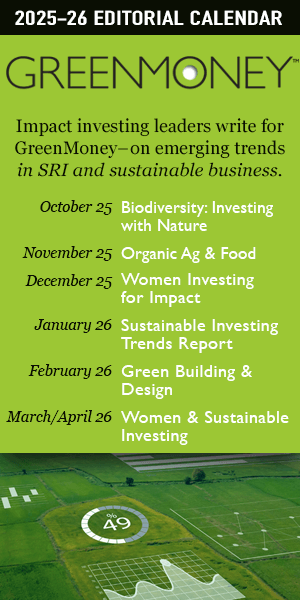Glimmers of hope amid tough times
Now, where were we? A year ago at this time, we looked ahead and confidently saw more engagement, new initiatives and a continuation of the forward march of progress that constitutes a typical year in the world of sustainable business. We took in the enormity of the problems facing humanity and the planet, and scanned the horizon. What we saw were companies continuing to make commitments, form alliances and reach new levels of achievement in sustainability. And the year ahead certainly would bring more of the same. Or so we predicted.
And then 2020 happened. Suffice to say, it was a year like no other: Crisis after grim crisis, as the ravages of a changing climate revealed themselves in ways large and small, a pandemic devastated families and nations alike, racial justice protests roiled communities, the global economy convulsed and political leaders the world over scrambled to respond — some more successfully than others.
Such turmoil easily could have spelled the end, or at least the pause, of anything having to do with business and sustainability. But it didn’t. The forward march of progress not only continued but accelerated.
What happened? Two words: business fundamentals.
At last, sustainability has emerged from the shadows to be considered part and parcel of corporate success. Indeed, for many of the world’s largest companies, sustainability is seen as key to minimizing risk, increasing resilience, enhancing competitiveness and unlocking new opportunities. The management of environmental and social risks — as viewed through the lens of ESG metrics — “will likely emerge as the new standard of comprehensive corporate governance and underscore how non-financial E, S and G factors may affect long-term valuation,” Brie P. Williams, a vice president at State Street Global Advisors, said last fall.
Put another way, a company’s sustainability profile increasingly may be baked into its stock price and creditworthiness, possibly affecting the cost of capital it may need for growth. That’s a game changer.
So, where are we?
Ambition Uptick
Despite the disheartening headlines, action on ESG concerns has continued relatively unabated in corporate C-suites and boardrooms. To our immense satisfaction, we saw little carnage within corporate sustainability departments during 2020 relative to previous economic downturns, when such functions were often among the first to be downsized or jettisoned.
“Sustainability leaders are in a unique position, with their experience in navigating across their organization’s functions, to help align CEOs and their employees toward common environmental and social causes,” wrote GreenBiz Vice President and Senior Analyst John Davies in “State of the Profession 2020,” the latest edition of GreenBiz’s biennial report on the role of sustainability professionals inside companies. The report found that “in large companies, there has been a significant increase in terms of the sustainability leader reporting to the CEO, from 19 percent in 2018 to 26 percent today.”
Given this, it was not surprising to see an uptick in corporate ambition on sustainability issues. “Net-zero” became a key commitment during 2020 — goals that aim to eliminate, at least on paper, a company’s greenhouse gas emissions, water extractions, fossil-fuel use or deforestation activities by a given date. And while those target dates are typically decades hence, they set the stage for activists, investors and other self-appointed watchdogs to monitor corporate progress toward their stated goals.
Perhaps more surprising is the rise of “restorative” and “regenerative” among large companies in describing their ambitions to address human and planetary woes. The idea is simple but profound: a switch in thinking from “doing less harm” to “doing more good.” In other words, the leading edge of sustainable business is shifting from companies having inadvertently negative impacts to having deliberately positive ones. And while most such corporate statements are still more aspirational than actionable, they signal a critical shift in thinking about the role companies can play in the years to come.
It’s a lot to take in, especially for the many critics of sustainable business activities, who are prone to see virtually any corporate action as too little, too late. And they might be right: Most corporate commitments and achievements are insufficient to meet the moment, let alone the future. Incremental change won’t cut it at a time when so many planetary boundaries are being crossed and so many social and environmental indicators are spiraling out of control.
Peeking Around Corners
What will it take for companies to dramatically step up their ambition and actions? That is a defining question of the decade. No doubt the answer lies in a combination of investor pressure, technological innovation, consumption shifts, governmental pressure, new circular business models that reward resource efficiency — and more than a little grit and determination.
It’s a tall order, to be sure, but the future demands nothing less.
As we dare to look ahead, however tentatively, at 2021 and beyond, we see more of the same. The seeming mundanity of that sentence belies its significance: Corporate sustainability efforts are continuing apace, even amid economic uncertainty and a global pandemic that, as of this writing, is far from contained. It wasn’t very many years ago that the future of corporate sustainability was uncertain even during good times.
What’s also different about this moment is the alignment and, increasingly, integration of social and environmental issues inside companies. While it has long been known that the poorest among us endure the brunt of air and water pollution, climate change and other problems, companies largely have focused on social and environmental issues separately and, all too often, unequally.
That’s changing. The rise of social justice movements around the world is shining a harsh light on the linkages between environmental sustainability and social cohesion, not to mention economic vitality, and ESG-savvy investors are beginning to reward companies that better align corporate strategy with the interests of both people and the planet.
As the global economy finds its footing in the coming months, and as a new, more environmentally friendly administration takes hold in Washington, D.C., we expect to see the continued rise of concern and action on climate, biodiversity, air and water pollution and other pressing issues alongside deeper, more strategic investments in clean energy, green infrastructure, sustainable food systems and other elements of an emerging clean economy.
Indeed, the world’s biggest environmental challenges are being seen as inextricably linked to community resilience, economic prosperity, public health and national security. As such, they are rising to the top of the agenda for more and more companies and countries.
These are among the glimmers of hope we see during these turbulent times.
Top Sustainable Business Trends 2021:
- Ocean-Based Sequestration Heats Up
- The ‘S’ in ESG Gains Currency
- Community Investments Pay Dividends
- Aquaculture Becomes a Net-Positive
- Industrial Decarbonization Picks Up Steam
- Nature Takes Root on the Balance Sheet
- Sustainable Mobility Drives the Newest Perk
- Aviation Plots a Sustainable Course
- The Circular Economy Shows Its Human Side
- Corporate Advocacy Gets Louder
Find more on each of these Trends in the 14th annual State of Green Business Report, our annual report card on progress by the world’s largest companies. The report, published in partnership with S&P Global Trucost, is a FREE DOWNLOAD.
Article by Joel Makower, Chairman & Executive Editor, GreenBiz Group
















